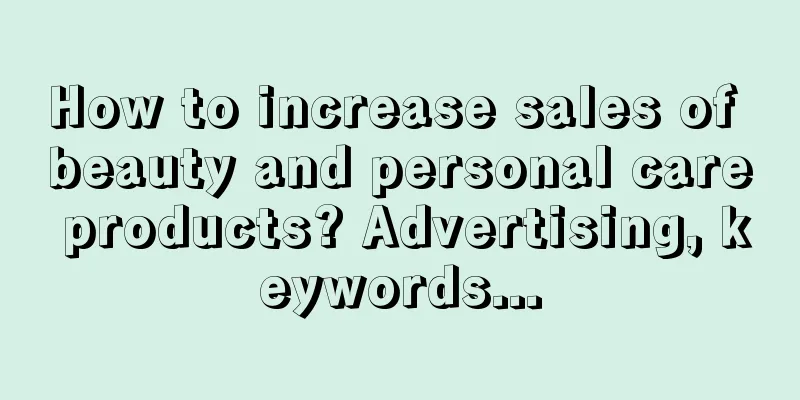How to increase sales of beauty and personal care products? Advertising, keywords...

|
The pandemic has prompted consumers to turn to online shopping, especially in the beauty, health and personal care sectors.
Research firm Ideoclick predicts that the proportion of online sales in the global health and beauty sector is expected to rise from 16.5% in 2020 to 23.3% in 2025. In addition, a survey of more than 2,000 American consumers showed that most consumers have purchased these products online . Among them, 67% of consumers have purchased beauty products online , and 80% have purchased health and personal care products online .
According to the survey, social platforms have a huge impact on brand and product awareness , but rarely promote direct purchases : 41% of beauty consumers and 33% of health and personal care consumers said they might buy a product because of seeing it on a social platform . However , they usually buy through other channels, and only a very small number of consumers said they would buy directly on social platforms .
According to Statista, consumers spent an average of 145 minutes per day on social media in 2020. Social media advertising has a huge influence on consumers.
Counterfeit products are a common problem for beauty, health and personal care brands. More than half of online beauty, health and personal care product consumers are concerned about counterfeit and imitation products. Consumers are usually unable to distinguish between genuine products and imitations , and it is easy to buy the wrong product.
Brands and sellers can enhance customer trust by highlighting the authenticity of their products in ads and listings and showcasing their unique features to distinguish them from counterfeits .
79 % of consumers said that their preferred platform for buying beauty products online is retailer websites (such as Amazon, Walmart, Target, etc.). 14% of consumers said they would choose DTC websites, and only 7% chose social platforms .
For health and personal care products, 86% of consumers prefer to buy through retailer websites, while 9% and 5% prefer direct-to-consumer websites and social platforms, respectively .
It is understood that consumers usually search for two to four keywords when shopping online . Compared with broader short-tail keywords, highly specific keywords have much better results . Companies can drive sales by using unique and targeted long-tail keywords. For example, using "black all- natural liquid eyeliner " is more effective than "eyeliner" . cosmetic Personal Care healthy |
>>: Logistics costs will continue to rise next year, and it is not impossible that they will double!
Recommend
Survey on American holiday gift-giving habits: 52% of people value gift packaging
The peak shopping season is here. In addition to ...
Amazon faces a class-action lawsuit, will sellers also be held accountable?
In the early days of the outbreak, hygiene and ep...
What is ZealousCRM? ZealousCRM Review, Features
ZealousCRM is a tool that provides computer progr...
Shopee 11.11 promotion ends, with the number of goods sold by tens of thousands of cross-border sellers increasing by more than 10 times
November 14, 2022, China - Recently, the leading ...
American woman's face was "whitened" after buying skin care products in Temu
Recently, an American consumer shared her experie...
Cross-border e-commerce is growing rapidly around the world. Cainiao helps more Chinese cross-border merchants to speed up logistics
On September 17, at the first China (Shenzhen) Cr...
Amazon PD will be diverted to multiple parties. If sellers want to increase sales, they can only offer low prices?
This year, affected by inflationary pressure, mos...
Under Amazon's low-price strategy, it is the platform's consumers who ultimately pay the bill
As antitrust investigations into Amazon escalate,...
Shopify's revenue growth slows to its lowest level in seven years
Shopify's revenue grew 22%, but growth slowed...
Not authentic! Many Amazon sellers claim that their pictures were stolen by Temu peers
After spending nearly two and a half years, Dahua...
What is Caspian Finance and Taxation? Caspian Finance and Taxation Review, Features
Caspian Finance and Taxation is a company that cr...
Traffic explosion! Sellers' products sold over 50,000 units
The peak season in 2021 is really "booming&q...
Nansha Port is congested for 10 kilometers, Amazon has increased its requirements for goods entering the warehouse...
The seller used black technology to send hundreds...
Grab and Lazada team up to make goods delivery more environmentally friendly
Grab , a popular Southeast Asian app , has announ...
Summer Economy Overseas buyers are fascinated by China's "facekinis", and sellers in the industrial belt are busy with orders at SHEIN
Since the summer , the market demand for sunscree...









